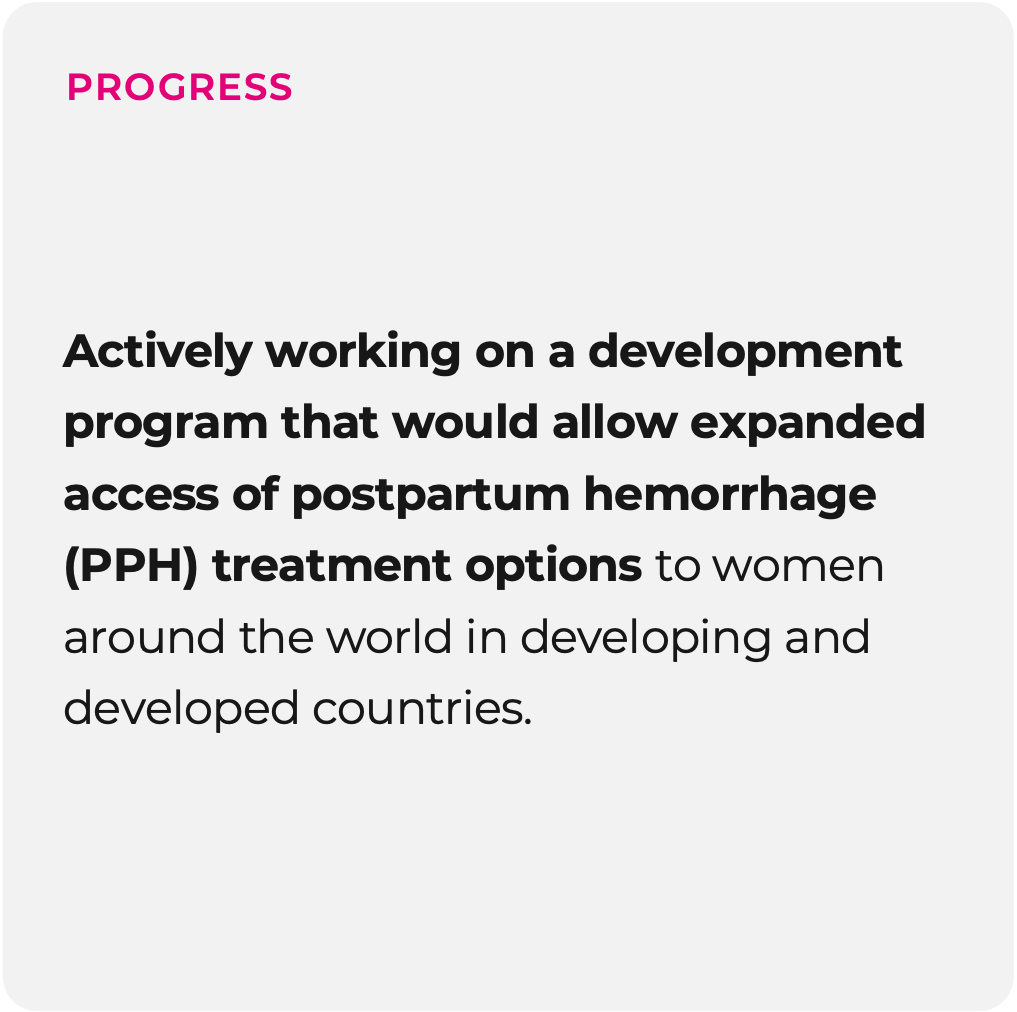Access to medicines and healthcare
Access to medicines and healthcare is a key pillar of our ESG strategy, and it is critical to helping women and girls achieve their promise. We aim to help address the barriers to accessing our medicines — whether they are geographic, financial, social, cultural or political — and create a better and healthier every day for every woman.
Progress on goals
- Work together with partners to help prevent an estimated 120 million unintended pregnancies by 2030 by providing 100 million women and girls in low- and middle-income countries (LMICs) with affordable access to contraceptive options by 2030.
- Aim to work with health authorities to expand access to postpartum hemorrhage (PPH) treatment options for women around the world.


Improving access to contraceptive options
The decision of when — and whether — to start a family is one of the most important choices a woman can make with critical consequences for her life and that of her family, community, and economy.
Yet, for millions of women and girls worldwide — especially women from low socioeconomic backgrounds — this life altering decision is at times no choice at all.
Family planning can also help women space out their pregnancies and avoid adolescent pregnancies, both of which lead to safer births. Unfortunately, women in low-income countries often lack access to contraceptives that make these choices possible.

Our Her Promise Access Initiative collaborates with organizations around the world to help women and girls prevent unplanned pregnancies. The initiative is part of a multiagency global effort to expand contraception availability to the 73 lowest-income countries.
The initiative began in 2012 at the London Summit on Family Planning. The resulting program — known as FP2020 — brought together stakeholders including nongovernmental organizations (NGOs), government agencies and pharmaceutical companies. We began our participation when we were a part of our former parent company. As part of this coalition, we partner with NGOs to provide patients with family planning options to help address this global need. Together with collaborators around the world, we aim to provide education, training and improved access to family planning options.
Learn more about our Her Promise Access Initiative
Maternal health and our commitment to mothers
Approximately every two minutes, a woman dies from preventable causes related to pregnancy and childbirth*. We believe that the life and health of both women and their children should be protected from conditions such as postpartum hemorrhage (PPH), preeclampsia, preterm labor, and the many other risks that mothers-to-be too often face. A healthy pregnancy and childbirth are cornerstones of gender equity.
Organon was founded with a relentless commitment to deliver innovation and fill critical gaps in care, with a particular focus on addressing maternal and peripartum conditions that impact mothers. In collaboration with stakeholders across the healthcare ecosystem, we have the power to deliver a new era in women’s health and advance our shared goals:

Working across the healthcare continuum
with healthcare professionals, health authorities, policymakers and through private-public partnerships to address innovation and access challenges, and advocate for improvements in care for maternal and peripartum conditions.

Investing in innovative medical solutions
to support the timely management of conditions such as PPH, helping to improve maternal health outcomes and advance towards our vision of a healthier every day for every woman.

Advancing science and research to serve women’s unique needs
by advocating for improved guidelines and clinical protocols that allow for emerging interventions to advance current standards of postpartum care. We remain committed to bringing forth clinical evidence and innovations, alongside the global health community, that meet the current needs in PPH care.
PPH is a potentially life-threatening obstetric emergency that can occur after childbirth and requires timely medical intervention. Despite being one of the most common complications of birth, there has been little progress in this space.
We are committed to working with health authorities to find ways to expand access to postpartum hemorrhage treatment options to women around the world. The World Health Organization (WHO) is working alongside key stakeholders in the public and private sector, including Organon, to tackle this issue through research, advocacy and progress with the first global coalition focused on PPH.
*UNFPA, Maternal Health, May 2022, available: Maternal health (unfpa.org)

Her Plan is Her Power
Around the world, unplanned pregnancies are preventing women and girls from achieving their promise. We want to rewrite their future.
Organon’s multiyear global initiative, Her Plan is Her Power, includes a portfolio of programs, collaborations and investments to address inequities in access to contraception and accelerate our response to unplanned pregnancies to ensure that women and girls have the power to plan their future.
Our portfolio-based approach to access
Organon’s access to medicines efforts are overseen by the head of Worldwide Government Affairs and Policy, in full collaboration with other key members of our Executive Leadership Team, including the heads of R&D, Manufacturing and Supply, Global Business Services; the Chief Commercial Officer; and the General Counsel and Corporate Secretary.
The ESG Committee of the Board of Directors, the ESG and Policy Council at the management level, and the franchise governance teams develop and implement Organon’s access to medicines strategy. Although we have ESG-related metrics embedded in our company scorecard, which has an impact on executive compensation, we do not currently include any specific access-related metrics on the scorecard. Our Board of Directors also reviews enterprise risks and discusses them with management, including issues relevant to our business, reputation and strategy, including intellectual property risk, pipeline and business development, pricing and patient access, legal and regulatory matters, and manufacturing.
Our approach to access to medicines and healthcare is tailored to each of our three product portfolios and underpinned by our commitment to advancing health equity. Given the unique business context of each of our three product portfolios, we do not have an enterprise-wide approach to access to medicines and healthcare. Instead, our approach to access is tailored to the products in each portfolio.

We believe that women’s health can have benefits that extend beyond women to their families, societies and economies. We design our access programs in a fit for purpose way to reach the women who need our products the most.
Women’s Health
In our Women’s Health portfolio, we are working to expand access to our contraceptive products, and other products across the portfolio in areas such as fertility, bacterial vaginosis, and osteoporosis.
Established Brands
Our Established Brands portfolio comprises products that are generally beyond market exclusivity and face generic competition in the markets where they are available. We continue to preserve their value to patients, healthcare providers, and health systems by investing in clinical trials to expand treatment indications and digital health apps.
Biosimilars
Our Biosimilars portfolio comprises products that deliver value and cost savings for health systems and patients. We have implemented patient assistance programs in the United States and Canada that enhance access to these products for those eligible, and we are exploring the launch of similar programs in other countries. Given the contractual arrangement with our development partners, our ability to expand into new markets is limited.
We strive to make sure that our innovative and lifesaving products are available to those who need them globally. However, there are times when it is impossible or impractical to register products or specific indications for approved products in a particular country due to commercial reasons. In those circumstances, we may endeavor to satisfy unmet critical medical needs for life-threatening conditions, in rare and isolated cases, through alternative processes as described in our unregistered product supply (UPS) guidance. We must always be mindful that such supply is never for the purposes of generating a product sale or otherwise benefiting Organon’s business and must meet the letter and spirit of this guidance and of the applicable laws and regulations.
Moreover, we seek to support health equity efforts by enhancing diversity in clinical trials. We continue to prioritize health equity in our clinical programs in various ways, such as collecting more data from underserved and underrepresented populations to continue to build more culturally relevant and appropriate practices. Learn more about our efforts in product quality and safety.
Fertility access
When Organon was founded, we recognized the long-term economic implications of falling birth rates and unplanned pregnancy. Holistic family planning policies that create an enabling environment for individuals to choose their reproductive future help to build demographic resilience. We believe everyone should be able to start a family if they choose to, regardless of location, financial status, relationship or gender status, sexual orientation, or demographic and cultural background.
However, in many countries, barriers to accessing fertility treatments persist. We work with partners to advocate for education and policy reforms to ensure equal access to fertility treatments and services for all aspiring parents around the world.
Examples include:
- In partnership with Fertility Europe, we are advocating for equitable access to fertility treatment, including addressing the range of emotional twists and turns that take place along the fertility journey.
- We are proud to be the lead private sector partner of Asia-Pacific Economic Cooperation (APEC) Smart Families, offering our perspective and expertise as a women’s health company and helping to support the creation of the most comprehensive set of family planning policies ever developed for this region. The Menu of Policy Options centers around reproductive choice, taking a comprehensive approach to proactively provide people with the information, tools, and resources to make reproductive health decisions that best support their personal goals. The full menu can be viewed here: APEC Smart Families.
Value and affordability
For healthcare to be broadly accessible, it must be affordable.
We are committed to improving the affordability of care for women throughout the world. We work with women’s health and gender equality advocates, patient organizations, NGOs, multilateral organizations and commercial partners to expand access and reduce barriers to care. Our investments in this area include health literacy, healthcare provider training, support services and financing and affordability solutions aimed at improving access to health services and medications for women around the world.
Established Brands
Within our commercial strategy, we continue to focus on Established Brands that provide high-quality options to governments and other payers.
Our Established Brands portfolio embodies early innovation and deep heritage, including medicines that have in some cases been helping patients for decades, and some that have earned household-name status. The 51 products in our Established Brands portfolio represent a broad array of products that are generally beyond market exclusivity. The portfolio includes leading brands in cardiovascular, respiratory, dermatology and non-opioid pain management, for which generic competition varies by market. Yet feedback from health authorities, healthcare professionals, and the general public tells us that our medicines are still helping people around the globe to better manage their health, especially in those countries where branded products are preferred.
Expanding upon this legacy, we have a chance to apply a renewed focus on this portfolio and seize new opportunities where they exist to bring these important treatments to people who need them. We are maximizing every opportunity to meet evolving needs and reinvigorate our presence.
Biosimilars
Organon aims to improve healthcare economies and treatment access by providing safe and effective biosimilar medicines, because we believe biosimilars play an important role in making healthcare budgets more sustainable and treatment options more accessible to patients.
Biosimilars are biologic medicines that are highly similar, but not identical, to reference biologic medicines, which are therapies produced by living cells.
Biosimilars have no clinically meaningful differences from reference biologic medicines and must meet rigorous standards for market approval. They provide additional biologic treatment options and introduce market competition that can potentially reduce the costs of treating serious medical conditions.
We recognize the importance of delivering treatment options that potentially help reduce spending pressures on healthcare systems and enable a greater number of people to access important medicines. We champion care equity by supporting increased access to biologic treatments and we see an enormous — yet currently underutilized — path to realize this goal by:
- Incorporating biosimilars into the biologic treatment life cycle.
- Increasing adoption and uptake of biosimilars with payers and prescribers.
Learn more about our product donations to patient assistance programs in our ESG reporting center
Responsible pricing
We seek to advance responsible pricing to help improve health equity and access to medicines and healthcare. All price changes on our products, in all markets, go through our defined review and approval process.
Our standard operating procedures define the pricing governance process, including the purpose, scope, key principles and responsibilities of key stakeholders in pricing governance. This governance requires local market oversight by appropriate teams, including Finance, Legal and the Managing Director, and it also incorporates a global review and approval process.
We regularly review our pricing strategies and prioritize patient access to therapies. We know that situations vary from market to market and from patient to patient. When considering pricing, we look at factors including value to patients and healthcare systems, unmet need, access, R&D sustainability and competition.
To achieve greater accessibility and equity, we offer many different pricing and investment approaches, including tiered pricing, that expand access in LMICs. In areas of highest public health need (low-income and select lower-middle- income markets), we partner with global NGOs, governments and other stakeholders to offer family planning options at cost-plus pricing.